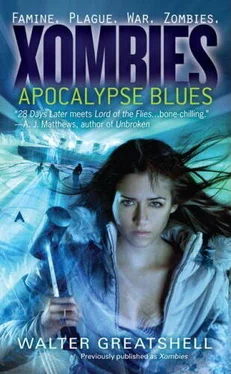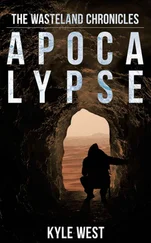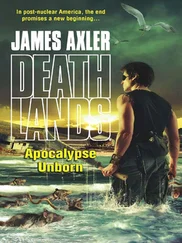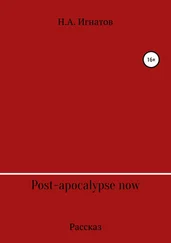Walter Greatshell - Apocalypse blues
Здесь есть возможность читать онлайн «Walter Greatshell - Apocalypse blues» весь текст электронной книги совершенно бесплатно (целиком полную версию без сокращений). В некоторых случаях можно слушать аудио, скачать через торрент в формате fb2 и присутствует краткое содержание. Жанр: Фэнтези, Триллер, на английском языке. Описание произведения, (предисловие) а так же отзывы посетителей доступны на портале библиотеки ЛибКат.
- Название:Apocalypse blues
- Автор:
- Жанр:
- Год:неизвестен
- ISBN:нет данных
- Рейтинг книги:3 / 5. Голосов: 1
-
Избранное:Добавить в избранное
- Отзывы:
-
Ваша оценка:
- 60
- 1
- 2
- 3
- 4
- 5
Apocalypse blues: краткое содержание, описание и аннотация
Предлагаем к чтению аннотацию, описание, краткое содержание или предисловие (зависит от того, что написал сам автор книги «Apocalypse blues»). Если вы не нашли необходимую информацию о книге — напишите в комментариях, мы постараемся отыскать её.
Apocalypse blues — читать онлайн бесплатно полную книгу (весь текст) целиком
Ниже представлен текст книги, разбитый по страницам. Система сохранения места последней прочитанной страницы, позволяет с удобством читать онлайн бесплатно книгу «Apocalypse blues», без необходимости каждый раз заново искать на чём Вы остановились. Поставьте закладку, и сможете в любой момент перейти на страницу, на которой закончили чтение.
Интервал:
Закладка:
With glacial speed I began to move. Far more agile than I, the crab anchored its legs and improved its grip-I wasn't going anywhere. Reaching for a place to lodge the deadwood of my right hand, I encountered one of the hot-water bottles and clutched it to me like a toddler with a security blanket. It was still warm, the chemical heating element still circulating. By taking it, I surrendered to the crab, and was drawn head-first to its bristly mandibles.
Taking the bag's drain valve in my teeth, I tore it open and squeezed with all the strength I could still muster, inhaling the hot water. There was no conscious plan in this, but rather some sort of physical compulsion, like an infant suckling milk-what had been my mind was subsumed to a larger but less-civilized intelligence spreading throughout my body. Though the water was scalding, the little of me that was left had no veto power over this ruthless new master, which registered it as a good thing. I did not stop drinking even when I felt organs rupturing inside me.
I was Gumby. That was what this was about. The freakish world was my toyland, my flesh, mutable clay. If it didn't hurt, why not play?
As I kept drinking, I could feel the heat circulating. My belly became distended in a way that would have been agonizing to a living person, but I could feel myself softening up, growing more limber every second. My Maenad mind quickened.
The crab was fussily chewing a snipped-off hank of my hair with some scalp attached. I had only felt it as a tug and a cold spot behind my ear. With an abrupt jerk I broke free, inadvertently taking one of its claws with me. The crab didn't seem at all troubled by the damage or disappointed by my escape, and I felt a rush of mutual understanding: We were both privy to a perfect peace unknown to higher forms of life.
Fully aware that the cold would soon immobilize me again, I arthritically clambered out and atop the vehicle. A number of crabs were in the way, but I jabbed at them with the severed claw to drive them back.
Standing on that overturned hulk, with its wheels cartoon ishly splayed outward, I did stop and stare at the surrounding seabed, my flight arrested.
It was solid crabs, covering every square foot of ocean floor, their legions receding into the murk. Surrounding the tank were layers, drifts of them, piling up ten deep. Around the front, two heaps seemed particularly busy-as I watched, a face surged up from the living mass, crab claws dragging down lips and eyelids, giving the features an exaggerated expression of gaping terror. It was Lowenthal. His one remaining eye looked at me, and I had an electric sense of contact, of his voice saying, Go. Then a claw penetrated his mouth and wrenched at his tongue. They pulled him down.
Shedding the heavy bulletproof vest, I kicked off for the surface.
There were fires above, casting the broken ice in fluorescent candy colors, but the heat did not radiate through the water. Coming up underneath the floating wrack, I found it already frozen together. I had no buoyancy, no air in my lungs, and had to keep treading water every second or I would drop to the bottom. The crabs were content to wait, I knew.
Working my way up between jumbled slabs, I punched through glassy new ice, shattering my knuckles but opening a sharp-edged hole I could cling to. My hair and face froze instantly on contact with the air-air that was seventy or eighty degrees colder than the water. Not far away, I could see flames and smoke coiling into the midnight sky. I boosted myself up on the ice and ran for it.
Water drained from my every orifice and flash-froze as I moved, so that I shed icicles with every step. My flesh was crystallizing, cracking, splitting open at the joints. As I ran I encountered bits of scrap and a charred torso, finally coming in range of the fire's warmth. Its source was the blackened shell of a hovercraft, a giant crucible guttering in a pool of meltwater, and I sloshed up to it with arms outspread.
I don't know how long I stood there. It might have been minutes or it might have been hours. Eyes closed against the withering heat, I could feel the ice glaze dissolve and the tissues of my body become pliable, alive. Not alive in the ordinary sense, which was as a mysterious entity separate from my mind, with its hidden anatomy and dimly recognized processes, but alive like a very familiar landscape whose every feature was known to me and whose every part I could not only inspect from afar but also inhabit at will with my mind's eye.
I could ply the rivers and tributaries of my new Xombie structure and explore the deep, meandering wounds made by shrapnel. I could close the wounds and seal them, just as easily as sealing my lips. I could even pucker my tissues around bits of scrap, squeezing them from one muscle to another until they emerged from bloodless slits in my side and plopped into the water.
I reached up and touched the implant, sunk in rigid bone. I could actually taste the metal screws and test the grip of their threads in my skull. The distant echo of my old sense of wonder wafted by like music in a passing car. Then I flexed my forehead. With a crack, the implant popped loose into my hand. It gleamed in the firelight, and I let it fall.
The sea was littered with wreckage. Here and there, Xombies wandered like lost children at a fairground, fast succumbing to the cold. I was neither afraid nor empathetic, and they were equally indifferent to me. But something did stir me-a riotous sound far across the ice. It rang in my head like the voices of long-dead loved ones, nearly forgotten. It was unbearably sweet and sad. Beckoning.
It was people. Miles away, Utik's people were leaving Thule, a caravan of buses, snowmobiles, and dogsleds streaming north as Valhalla burned. The ones left behind were too busy fighting to stop them, and I could sense both the eager flight of the Inuit and the hatred and misery of those in the domes. This knowledge came through all my pores, as if my entire body had become an antenna attuned to the signals of fragile humanity. I could feel them, and they were all I could feel: a heartbreaking symphony in the vacuum, a kaleidoscopic concert of destruction, and I ached to liberate every one of them from the hideous threat that hung over them-the parasite of time. I had no choice: They were all there was of me, each one a jarringly vivid light in the vast emptiness of eternity, yet here they were at the whims of dismal mortality like candles set afloat in the night sea, to drift and fizzle out. No. They had to be saved. I had the power to save them. To preserve them, as I used to preserve delicate flowers in my memory book.
Lulu.
I stopped.
Lulu. Hurry.
It was the sound of the wind, playing my name. I couldn't tell if it was one voice or many, but it reverberated in the sinews of my dead blue heart like a benevolent god. It knew me, knew me in a way I no longer knew myself, reminding me of what I most desperately wanted to remember: who I was. The Voice was not calling me to Thule, but back in the direction of the boat.
The boat-I had almost forgotten about it. Not to mention the guys in it. Out of sight out of mind had become the way of things now. Remembering those men was a shock, like finding valuables long thought lost, living heirlooms held in hock. They were mine!
Torn, I looked off toward the flickering chaos of Valhalla, miles away. The complex was so large, the distance was deceiving-some part of me knew I could never make it that far, that I would set like concrete before I was even halfway there, but it was very difficult to sever my attention from those warring throngs and run the opposite way. Equivocation was foreign to my new nature. It wanted to just go. Running against the current, I went for the sub.
Following serpentine power cables across the ice, I felt myself freezing again, but found I could hoard more heat than before-my skin had toughened tremendously, creating a layer of insulation, and the soles of my feet were armored in callus. Things inside me were restructuring and streamlining as well. Even with that, I didn't have long, but the boat wasn't far, and I could move very fast. I still wasn't breathing-or rather, I was breathing through my whole body. Absorbing. Filtering. I felt tireless and light, as if the world was rolling beneath me while I was harnessed to a fixed point in the sky.
Читать дальшеИнтервал:
Закладка:
Похожие книги на «Apocalypse blues»
Представляем Вашему вниманию похожие книги на «Apocalypse blues» списком для выбора. Мы отобрали схожую по названию и смыслу литературу в надежде предоставить читателям больше вариантов отыскать новые, интересные, ещё непрочитанные произведения.
Обсуждение, отзывы о книге «Apocalypse blues» и просто собственные мнения читателей. Оставьте ваши комментарии, напишите, что Вы думаете о произведении, его смысле или главных героях. Укажите что конкретно понравилось, а что нет, и почему Вы так считаете.











